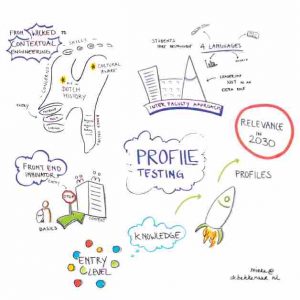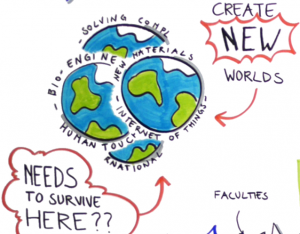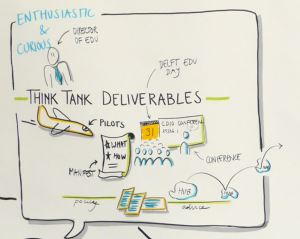In my August 2017 post about professional profiles and engineering role models I discussed the difficulty of their incorporation, as well as the development of a good representative image of engineering practice in our curricula. The real world is even more complicated. In less than twenty years we have transformed the way we work, communicate and do business, and these trends will only accelerate in the future. In other words: how future-proof are the professional roles I described in my previous blog?
Solving problems and designing solutions these days require at least a multi-, often interdisciplinary approach. Engineering shifts from almost purely physics and technology to a melting pot of these with social, behavioural and economic aspects as well. Many people still say the prime role of an engineer is designing the society, but I am of the opinion that engineering shall no longer be the centre of the society, but society shall become the centre of engineering. Engineers must learn to optimise not just efficiency but also social impact. And thus 21st century employers are increasingly looking for people with both in-depth working knowledge and human-centred skills.
“Engineering shall no longer be the centre of the society,
but society shall become the centre of engineering”
The questions that have kept me busy in the past couple of years are: are we educating our students with these sorts of skills and aptitudes, do we train them to be agile enough to adapt to the rapid changes, do all students who chose a certain specialisation have to learn the same thing, and how will this look like 15 years from now?
Think Tank
As a Co-leader of the 4TU Centre for Engineering Education, together with my colleague and educational consultant Renate Klaassen, we raised the question “What should engineers learn in the future and why should they do it?” In an attempt to explore how particularly Master programmes in engineering might be adapted to meet 21st Century needs, we set up a “Free Spirits Think Tank” with 14 members of academic staff, students, Valorisation Centre. Over the course of five workshops we tried to answer the following questions:
- What sort of student should we be educating?
- What will be the major changes facing students in 2030?
- What ‘added value’ can TU Delft deliver in terms of educational content?
- What learning processes are needed to prepare the future engineer?
Design Thinking
 Using ‘Design Thinking’, the Think Tank explored trends in engineering, science and society, established the most pressing needs within the engineering sector and developed ideas based on possible future worlds. The results identified the following important points:
Using ‘Design Thinking’, the Think Tank explored trends in engineering, science and society, established the most pressing needs within the engineering sector and developed ideas based on possible future worlds. The results identified the following important points:
- Definition of a career route should start early in the higher education process, either at the point of admission or during the Bachelor programme. This means that the educational institution should aim to identify motivated students who can excel in key scientific areas, are focused on personal development, can approach their subject matter from multiple perspectives, can cope with freedom of choice, are able to take the initiative and are self-regulatory in behaviour. Moreover they should have well-developed analytical and creative skills, and a talent for realising change.
- Introduction of ‘flexible personalised learning paths’ – by modules tailored to help students acquire the specific skills and specialist knowledge necessary to excel in their chosen prospective career direction.
- Education based on real-life cases, projects and research would give students a taste of collaboration, experimentation, failure and working with the outside world, and so introduce them to the key values of “passion, purpose and play”. Working on projects at interdisciplinary research or design institutes would enable students to forge links with the professional market in the engineering market.
- Preparation for innovation would enhance the reputation of TU Delft, already strong in producing engineering graduates who can apply creative working solutions to society’s problems. Increased contact and collaboration with external partners, including those outside the world of engineering, would help prepare students for future innovation.
These insights helped identify three new challenges:
- How do you create an engineering education programme in which personal development plays an important role, yet is academic enough to satisfy the accreditation bodies awarding Master degrees?
- How do you create more tailored personalised programmes that also form a coherent set of studies within the Master degree course?
- How do you create purposeful engineering profiles and programmes that will be useful to society in the future?
Hypothetical scenarios
 Nobody knows what’s going to happen in the future, but by looking at current trends, we can imagine possible scenarios. If we then consider the sort of knowledge and skills needed to survive and thrive in those situations, we can also help prepare the future engineer to face the needs of each potential future.
Nobody knows what’s going to happen in the future, but by looking at current trends, we can imagine possible scenarios. If we then consider the sort of knowledge and skills needed to survive and thrive in those situations, we can also help prepare the future engineer to face the needs of each potential future.
The next phase of the Think Tank’s process was to look at current trends within society and engineering and then ‘ideate’ hypothetical worlds based on combinations of these so-called ‘megatrends’, such as Climate Change, Big Data-Smart Data, Robotisation and the Internet of Things; Bio-engineering, Energy Transition, Safety and Security. Combining extreme hypothetical versions of these trends and then imagining the skills and knowledge an engineer would need in each of these worlds, led the Think Tank to ask the same question I had before: “Why do we teach all students the same thing? Could not we do better and train different types or ‘profiles’ of engineers whose knowledge would extend beyond engineering, science and design?”
Four distinctive professional profiles
The Think Tank came up with the concept of four specific engineering roles in particular contexts that provide the opportunity for differentiation. They partly overlap the professional engineering career tracks that are identified in the CDIO book “Rethinking Engineering Education – the CDIO Approach” by Crawly, E.F. et al.
Each type of engineer tends to play a different role in projects and work environments, as they start with a different heuristic question:
- Specialist: “How can I advance engineering knowledge and optimise technology for innovation and better performance by research?”
- System Integrator: “How can I integrate disciplinary knowledge and subsystem expertise for a complete solution?”
- Front-end Innovator: “How can I apply knowledge and use technology to develop out-of-the-box solutions that cross disciplinary boundaries and create value for society?”
- Contextual Engineer: “How can I exploit diversity-in-thought in developing realistic and acceptable solutions that create value in different cultures and contexts?”
In practice each engineer combines any of the four profiles but has a dominant profile as a whole. Each profile alone cannot realise a technological solution without the others.
Taking a closer look
The Specialist: who is able to use specific scientific knowledge to improve and develop complex technological systems and at the same time, is able to work with non-specialists in order to integrate that knowledge into system and product development. The Specialist needs a more T-shaped, with a more holistic engineering mind-set to understand the impact of the interfacing levels and innovate at the fringes of their specialism. Specialist training within a Faculty or Department would be complemented by multidisciplinary project work, which broadens the specialist’s more human-centred skill-set.
The System Integrator: who is system-oriented and has a helicopter view of technological fields but can look beyond technology to understand the importance of a broad range of issues from restricted budgets and regulatory frameworks to public safety impact and the ethical aspects of engineering. To design systems or processes that can perform as components of large-scale complex enterprises, they also have to consider the characteristic of the enterprise in which the system will operate and the context in which the system is developed. As with the Specialist, the System Integrator would be educated within the disciplinary department or Faculty, while developing interdisciplinary and interpersonal skills whilst working on interdisciplinary projects with industries or institutes.
The Front-end Innovator: is an entrepreneurial design engineer with a broad knowledge of both engineering and socio-economic factors. Able to work in horizontal flat organisations and work in teams of Specialists, System Integrators, design engineers, business managers, customers and end-users, the Front-end Innovator must have a good understanding of the engineering context as well as a good awareness of the user and client environment. They are capable solving complex adaptive problems and feel comfortable to follow agile methodologies with cross-functional team work, rapid iterations, rapid prototyping, continuous user involvement. The Faculty would provide the specialist engineering education, and the innovation-business components would be learnt whilst working on interdisciplinary projects together with students from the humanities or social sciences sectors and professionals with a different background than engineering.
The Contextual Engineer: excels at understanding dynamic technological change within different socio-cultural realms. The National Academy of Engineering (NAE) envisions the workplace of the near future as one of dynamic technological change that requires engineers to understand complex economic, political, cultural, global, and professional contexts. Development teams within multinational companies make use of the diversity of cultures and socio-economic environments to benefit technological innovation, product design and engineering business. This is where the Contextual Engineers come in. They need strong intercultural communication and collaboration skills, along with an open-minded approach to operating in differing cultural contexts. Technically adept, the Contextual Engineer understands constraints and consequences from the ethical, judicial, disciplinary and policy perspective.
 What works?
What works?
The four profiles have stirred considerable debate, across TU Delft and at the 2016 CDIO Annual Conference in Turku. Diversification of the future educational portfolio and differentiation in Master profiles have now been included in the TU Delft Vision on Education for further discussion and are the leading theme in TU Delft’s Education Day 20 December 2017.
Within the 4TU.Centre for Engineering Education we have decided to further explore the profiles. In the past half year I discussed the profiles with industrial partners while Renate Klaassen produced numerous workshops in different engineering environments with interdisciplinary populations of Master and PhD students to find out whether the profiles are recognized as valid ways to coin engineers on top of their disciplinary major.
Most people recognize the value of deep disciplinary working knowledge in all profiles. Some participants are afraid to be pigeonholed, but appreciate the spiral learning by looking at the same problem from different perspectives. They would rather consider the profiles as an optional role that could be played in different engineering contexts. Playing the different role makes people uncertain and let them step out of their comfort zone. About half of the people are in favour of embedding the concept in engineering education.
What’s next?
Over the past four months we have teamed up the project to develop a more foundational theory derived from additional design research. Reframing Studio has been asked to conduct a number of reframing steps and deliver workshops for:
- reframing the engineering profiles by redefining the goal of these future roles in terms of
- what they should contain exactly in terms of competencies;
- what the most advanced concept could be that is in good balance with our present stage of skills and mindsets and not more advanced than what we, university and job market, are able to accept and embrace, known as the “Most Advanced, Yet Acceptable” (MAYA) principle;
- in what way these engineering roles can be ideally embedded in higher education.
- discovering the competencies and the minimum levels that future generations of engineering students will need at graduation to deal with innovation and enable a fast upskilling in their job. These competencies and levels differ per profile, as each profile is associated with innovative engineering activities its own way.
In the past month we produced three workshops, two of them at the Dutch Design Week in Eindhoven , and one in the Teaching Lab at TU Delft, with extremely interesting results. Keep an eye on my blog. More workshops will follow in the coming months and I will keep you informed about their progression.
The text in this post is partly based on a flyer published by the 4TU.Centre for Engineering Education in 2016 and the paper “Impact of global forces and empowering situations on engineering education in 2030”, presented at the 2016 CDIO Annual Conference, available here.





